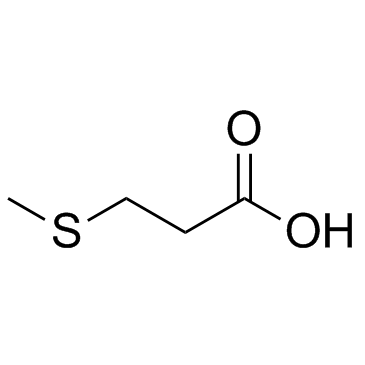
3-(Methylthio)propionic acid
CAS No. 646-01-5
3-(Methylthio)propionic acid ( 3-Methylsulfanylpropionic acid | 3-Methylthiopropionate | 4-Thiapentanoic acid )
产品货号. M20021 CAS No. 646-01-5
3-甲硫基丙酸是蛋氨酸(尤其是 D-蛋氨酸)的代谢物之一。林肯链霉菌培养物积累的 3-甲基硫代丙烯酸的量与培养基中甲硫氨酸的浓度直接相关。该途径中的第一个中间体可能是酮酸,然后将其氧化脱羧成3-甲硫基丙酸。
纯度: >98% (HPLC)
 COA
COA
 Datasheet
Datasheet
 HNMR
HNMR
 HPLC
HPLC
 MSDS
MSDS
 Handing Instructions
Handing Instructions
| 规格 | 价格/人民币 | 库存 | 数量 |
| 100MG | ¥389 | 有现货 |


|
| 200MG | 获取报价 | 有现货 |


|
| 500MG | 获取报价 | 有现货 |


|
| 1G | 获取报价 | 有现货 |


|
生物学信息
-
产品名称3-(Methylthio)propionic acid
-
注意事项本公司产品仅用于科研实验,不得用于人体或动物的临床与诊断
-
产品简述3-甲硫基丙酸是蛋氨酸(尤其是 D-蛋氨酸)的代谢物之一。林肯链霉菌培养物积累的 3-甲基硫代丙烯酸的量与培养基中甲硫氨酸的浓度直接相关。该途径中的第一个中间体可能是酮酸,然后将其氧化脱羧成3-甲硫基丙酸。
-
产品描述3-methylthiopropionate is one of the metabolites of methionine (especially of D-methionine). Cultures of Streptomyces lincolnensis accumulated 3-methylthioacrylic acid in amounts directly related to the concentration of methionine in the medium. The first intermediate in the pathway may be the keto acid which is then oxidatively decarboxylated to 3-methylthiopropionic acid.
-
体外实验Methionine has consistently been shown to be the most toxic amino acid in experiments devised to assess the relative toxicity of dietary amino acids. 3-methylthiopropionate is an intermediate in methionine catabolism in rat and monkey liver in vitro. This pathway appears to account for a major portion of methionine oxidation in vitro. Cultures of Streptomyces lincolnensis accumulated 3-methylthioacrylic acid in amounts directly related to the concentration of methionine in the medium. The first intermediate in the pathway may be the keto acid, which is then oxidatively decarboxylated to 3-methylthiopropionic acid. The purified 3-MTPA has antifungal activity in assays using F. oxysporum as a model fungus. Daily measurements of shoot and root length shows severe inhibition of seed germination and root and shoot development at concentrations above 12mg for partially purified extracts. 3-methylthiopropionic acid ethyl ester possesses potential anticarcinogenic properties by inducing differentiation in well-differentiated colon cancer cells. Treatment of RCM-1 cells for 4 days with 3-methylthiopropionic acid ethyl ester between the doses of 0.25 and 2 mM progressively increases the percent area occupied by duct structures relative to the control, and also induces an increase in the number and the maximum diameter of the ducts in each culture plate.
-
体内实验——
-
同义词3-Methylsulfanylpropionic acid | 3-Methylthiopropionate | 4-Thiapentanoic acid
-
通路Others
-
靶点Other Targets
-
受体Others
-
研究领域——
-
适应症——
化学信息
-
CAS Number646-01-5
-
分子量120.17
-
分子式C4H8O2S
-
纯度>98% (HPLC)
-
溶解度H2O:25 mg/mL (208.04 mM; Need ultrasonic)
-
SMILESCSCCC(O)=O
-
化学全称——
运输与储存
-
储存条件(-20℃)
-
运输条件With Ice Pack
-
稳定性≥ 2 years
参考文献
1.Surette R et al. Formation of 3-methylthioacrylic acid from methionine by Streptomyces lincolnensis. Isolation of a peroxidase. J Antibiot (Tokyo). 1976 Jun;29(6):646-52.
产品手册




关联产品
-
[pSer2, pSer5, pSer7...
[pSer2, pSer5, pSer7]-CTD (TFA) is a substrate for CDK7(cyclin-dependent protein kinase), a phosphorylated polypeptide at ser2, ser5, and ser7 of RNA polymerase II carboxyl terminus (CTD).
-
LiCl
LiCl 用于沉淀 RNA。
-
α-Terpineol
α-Terpineol 具有抗肿瘤、抗炎和抗菌活性,它通过抑制 NF-kappaB 通路的机制来抑制肿瘤细胞的生长。



 021-51111890
021-51111890 购物车()
购物车()
 sales@molnova.cn
sales@molnova.cn







